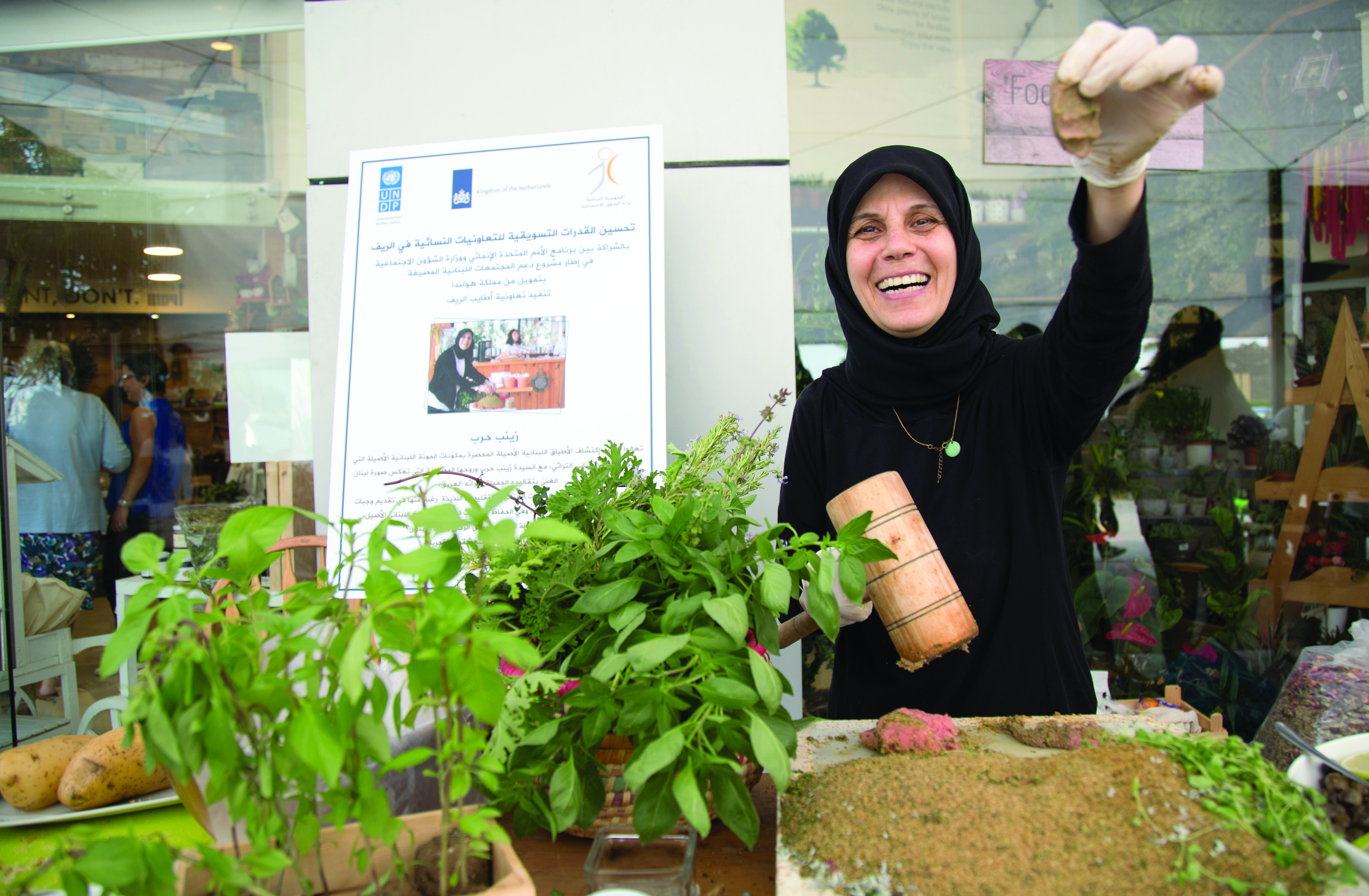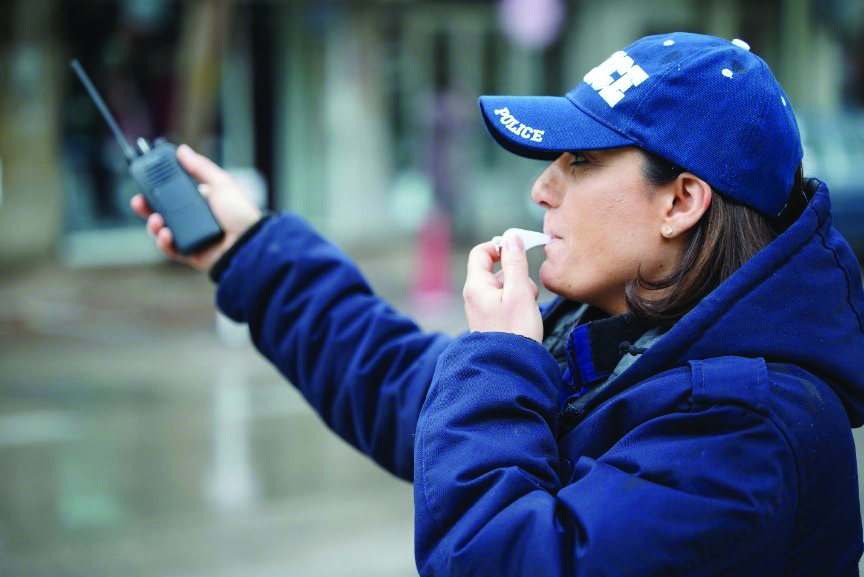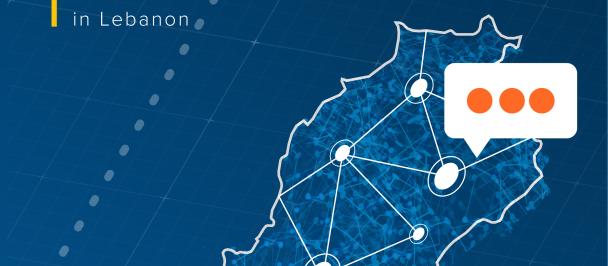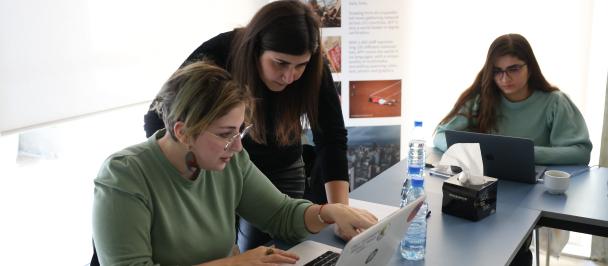A Story of Women from Agricultural Cooperatives who went Global
© UNDP
Safaa Ayyad*
Agricultural cooperatives have long been a haven for women in rural villages to work closer to home and not far from their domestic duties. However, the ingenuity of some women made them a leading example in their surroundings enabling them to reach worldwide. From cooking and the popular Saj, two women have turned into fighters for the traditional Lebanese cuisine and contributors to its dissemination as a message of peace at home and abroad.
Ambassador of «Frakeh and Freekeh»
When asked to introduce herself, Zainab Qashmar (54 years old) replies with full confidence that she is the ambassador of «the Southern Frakeh and Freekeh with distinction». A title she has strived and worked hard to achieve from 2008 until today. The housewife, who quit school in third grade, never imagined that joining the cooperative of her southern village of Halousiyah (Tyre district) would lead her to tour the world with her «tasty food and prowess in marketing the traditional Lebanese mouneh products.»
The Story of Zainab began after devoting many years of her youth to raise her three sons. When they grew up, she decided to be socially engaged in her town, so she joined the Halousiyah agricultural cooperative, which introduced her to the Souk el Tayeb where she marketed the products of five southern villages. And thanks to her talent she managed to sell all the products, and earned the trust of the organizers to showcase their distinctive product throughout the whole month. During the said month she gained the experience of «advertising and marketing» without any prior knowledge, «given that my sweet tongue is as good as my food.» From marketing Halousiyah olive oil, olives, thyme and southern Freekeh, Zainab then rose to the throne of southern cooking, which turned her life upside down, transforming her into a productive, socially and economically effective woman, offering food and culinary art for those who wish to learn.
Her main concern is to preserve the ancient Lebanese cuisine heritage and prevent «the invasion of the cities and their fast food of the Lebanese villages, whether in the South, the Bekaa, Mount Lebanon or the North.» Zainab considers food a tale rooted in the land, which is why she decided to make global the stories of South Lebanon cuisine. Therefore, she toured the southern regions seeking the elders to learn the old traditional dishes, their origin and story, and exclusively displayed them at the Souk el Tayeb. As soon as she became famous, she visited many countries around the world such as France, India, Singapore, Belgium and Switzerland, to present the «South Lebanese Freekeh». Thereby, she challenged many obstacles, such as language and communication, but «her smile and the taste of good food were like her introductory label.» Zainab is proud to have conveyed to the world a different image of South Lebanon, which is associated with wars, displacement, deaths and injuries, by introducing them to the true story of the land and its riches from which she compiles her dishes, which she confirms to be unquestionably healthy.
Although Zainab moved to Beirut to work at the Souk el Tayeb and the «Tawlet» restaurant and joined the «Atayeb Al Rif» Cooperative, she did not forget to upgrade the situation of the southern women who were part of the agricultural cooperative in Halousiyah. She relies on their agricultural products and energy to help prepare large quantities of the Freekeh recipe, contributing to their financial and moral support. «These women safeguard the southern dishes from extinction, and they linger in their land against all odds.» Qashmar is concerned about preserving the old things and the danger of the foreign food patterns spread in the local community, which is a threat to cultural identity, especially that the actual situation in Lebanon is not reassuring, and the cultural and food heritage is currently in danger. According to Zainab, today's generation knows nothing about traditional food and is only interested in speediness, and for that reason she offers cooking classes in Lebanon and abroad, for those who wish to learn. «My goal is to protect my country's heritage, so how can I not pass it on to others?»
Massoud: she broke traditions
Qashmar does not forget to introduce us to her work colleague Rima Massoud (52 years old), from the village of Ramlieh in the Aley district, who has another story of self-development and overcoming her social reality. Rima is skilled in baking the Saj bread and serves it in her village, to economically assist her husband who works in the agricultural sector. Rima was a member the «Association for Forests, Development and Conservation» which paved the way for her to participate in a training program with René Moawad Foundation for the development of the Lebanese women capacities, and she underwent training courses in economics, marketing, production and mouneh. These courses served as a crossing gate for her from the mountain to Beirut, so she defied the traditions and customs facing the «mountain women» by working outside her region. And the Association for Association for Forests, Development and Conservation supported her by transporting the Saj from the mountain to the «Souk el Tayeb».
At first, she was not bold enough to bake in public, but the encouragement she received and the flow of Lebanese and foreign customers to savor her Saj bread made her very daring. The qualitative shift in Rima's life has changed her economic situation, and she became the first supporter of her three sons to reach university and become involved in the work market. Rima carries a message to all women about the necessity to enjoy financial independence, and work from home whether in the «crochet, mouneh or cooking.» «Her dream of going to Beirut has turned into a tour with her Saj in European and Arab countries», to which she gives credit to the association which she joined years ago and which enabled her to tone her social, educational and economic skills.
* Journalist
Municipal Police
Women at work to restore dialogue with citizens
© UNDP
Janine Jalkh*
While women in Lebanon still struggle to breach the walls of the political sphere – in which the Parliament includes only six women MPs while the Government four ministers - they are slowly and surely beginning to make their way into municipalities, many of which have opened their doors to women.
The inclusion of women in municipal police units is now rising, as several municipalities have decided to inject their municipal police units with female officers who are capable of earning peoples' trust while protecting and reassuring them.
Mayors are convinced of the need to change the traditional methods of suppression and coercion in policing by replacing them with dialogue and engagement with citizens. Based on that, several mayors have opted for an inclusive municipal police, given that women can better play this role in a country where the culture of coercion and violence remains the norm.
The Ministry of Interior and Municipalities and the United Nations Development Programme (UNDP) with funds from the governments of Canada and the Netherlands, support the integration of women in municipal police as part of a larger project which aims at supporting municipalities to strengthen social stability. This was set based on consultations with municipalities with the aim of introducing policing methods that match growing needs for services of the population.
Given that women are more community-oriented, and enjoy better communication and listening skills than their male peers, female police officers have gradually begun to establish themselves in municipalities such as Bourj Hammoud, Mina, Enfe, Zahle and Antelias, to name but a few.
In Antelias - women-managed to establish themselves in the the municipality’s administration- after being recruited in 2017 by mayor Elie Abou Jaoudé. The mayor was extremely satisfied with the productivity of the women he had recruited in admin roles, so he decided to take it to another level by recruiting more women as municipal police agents. «They are simply more rigorous and much more professional than many men on the team,» the mayor explains.
Another asset that these new recruits can rely on is their gender. The cultural norms that force people to respect women and treat them gently, provides them with spontaneous help from the residents, making them eager to facilitate their tasks by showing kindness and greater cooperation.
In Bourj Hammoud, the inclusion of women in both municipal police and administration was initiated a while ago. Women now represent nearly 34% of the workforce and some of them have been assigned to traffic management.
In the beginning, female municipal police faced intimidation attempts and inappropriate jokes, but they have now gained confidence and established themselves in a rather difficult environment. The social context was also difficult for Zahle’s 15 female municipal police members who, over the years, have finally earned the respect of the people.
«In the beginning, nobody took us seriously, not only because we were women, but because of the poor perception the citizens had of the municipal police in general,» says Cosette Abdayem, who joined the team almost three years ago now. Over time, she says, she has learned to reconcile firmness and affability, sometimes using gentleness and active listening, and sometimes boldness and confidence when the situation got tough.
«Although very new at this stage, the feminization of municipal police would be more effective when municipalities are given the necessary resources and power to better enforce the law in a country where impunity is still prevalent,» explains an expert who monitors the project closely. According to her, women have an enormous potential that only needs to be revealed and put to good use.
* Journalist at L’Orient-Le Jour newspaper

 Locations
Locations


